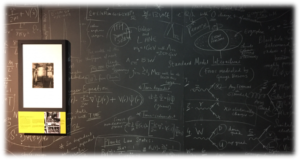Physics

The Physics Department manages two subjects: Physics and Computer Science.
Physics
“Physics is a tortured assembly of contrary qualities: of scepticism and rationality, of freedom and revolution, of passion and aesthetics, and of soaring imagination and trained common sense.”
Leon M Lederman (Nobel Prize for Physics, 1988)
Physics is the most fundamental of the experimental sciences, as it seeks to explain the universe itself from the very smallest particles – currently accepted as quarks, which may be truly fundamental – to the vast distances between galaxies. Essentially, it is the study of the four fundamental forces or interactions in the universe.
Classical Physics, encompassing areas of Physics such as Newtonian Mechanics, Thermodynamics and Electromagnetism continue to be taught, and form the foundations of the subject. Topics in Modern Physics, such as Quantum Physics and Particle Physics, are introduced at higher levels.
Recent Trends in Physics Education
Previously, Physics, as it was taught in schools, used to be rather heavy on mathematics, focusing on a quantitative approach to the subject. Students were to solve problems based on simulated scenarios which were crafted to match concepts that were intended to be assessed.
In recent years, there has been a shift towards a more qualitative approach. Students are required to understand concepts and apply them when solving authentic real-world problems. Command terms such as Explain, Suggest, or Predict require students to analyse the given contexts, dissect them, and make sense of them. There is a reduced focus on tedious mathematical manipulations. While the physics concepts that students are required to learn are clearly stipulated in the syllabus, no syllabus can limit the application of these concepts, hence students need to have a flexible and analytical mind in order to do well in the subject. Repetitive drill and practice serves little to help students improve, but the aim of practicing a wide range of problems is to expose students to the multitude of applications that physics concepts can be extended to. To quote from the SEAB syllabus write up,
These assessment objectives cannot be precisely specified in the subject content because questions testing such skills may be based on information which is unfamiliar to the candidate. In answering such questions, candidates are required to use principles and concepts that are within the syllabus and apply them in a logical, reasoned or deductive manner to a novel situation.
The Teaching of Physics at ACS (Independent)
All students in Year 1 and 2 (both Express and IP) will take Physical Sciences, a subject which combines Physics and Chemistry topics. It aims to build an interest for science in our students, and develop in them an aptitude for critical thinking and learning by inquiry.
In Year 3 and 4 (both Express and IP), students may opt to take Physics as one of their science subjects. Besides an increased breadth of content compared to Years 1 and 2, content previously taught is also further developed in depth.
In Year 5 and 6, students who have passed Physics in Years 3 and 4 may continue to take Physics either at the Higher Level (HL) or Standard Level (SL). This fulfils the criteria for students to offer at least one Group 4 subject. Students need to have obtained a Grade 6 or A2 in order to take the subject at the Higher Level.
In Years 5 and 6, Physics HL students may also do an Extended Essay in Physics.
Please refer to the page on Curriculum for more details.
Computer Science
Computer science itself is an international endeavour – the exchange of information and ideas across national boundaries has been essential to the progress of the subject. This exchange is not a new phenomenon but it has accelerated in recent times with the development of information and communication technologies.
Students in Computer Science are taught several skills, including the abilities to
- think procedurally, logically, concurrently, abstractly, recursively and think ahead
- utilize an experimental and inquiry-based approach to problem-solving
- develop algorithms and express them clearly
- appreciate how theoretical and practical limitations affect the extent to which problems can be solved computationally.
The Teaching of Computer Science at ACS (Independent)
Computer Science is taught as Computer Studies in Year 3 and 4. Students who are keen may opt to take the subject. Computer Studies aims to build the foundation for Computer Science in Year 5 and 6, but is not a prerequisite for it.
Computer Science is offered only at the Higher Level (HL) at Year 5 and 6. Students who are keen may opt to take the subject. This fulfils the criteria for students to offer at least one Group 4 subject. There is no prerequisite to take Computer Science.
In Years 5 and 6, Computer Science HL students may also do an Extended Essay in Computer Science.

